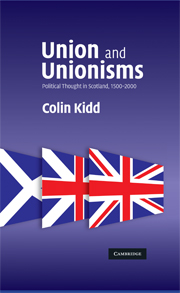Book contents
- Frontmatter
- Contents
- Preface
- 1 Introduction: the problems of Unionism and banal unionism
- 2 Unionisms before Union, 1500–1707
- 3 Analytic unionism and the issue of sovereignty
- 4 Narratives of belonging: the history and ethnology of organic union
- 5 From assimilationist jurisprudence to legal nationalism
- 6 The two kingdoms and the ecclesiology of Union
- 7 Early nationalism as a form of unionism
- 8 Conclusion
- Index
- References
6 - The two kingdoms and the ecclesiology of Union
Published online by Cambridge University Press: 06 July 2010
- Frontmatter
- Contents
- Preface
- 1 Introduction: the problems of Unionism and banal unionism
- 2 Unionisms before Union, 1500–1707
- 3 Analytic unionism and the issue of sovereignty
- 4 Narratives of belonging: the history and ethnology of organic union
- 5 From assimilationist jurisprudence to legal nationalism
- 6 The two kingdoms and the ecclesiology of Union
- 7 Early nationalism as a form of unionism
- 8 Conclusion
- Index
- References
Summary
In 1707 Protestantism and the English language – regardless of local variants in churchmanship and dialect – were the lowest common denominators of British nationhood. In Britons: forging the nation, 1707–1837 (1992) – one of the most influential history books in our times – Linda Colley argued that a shared Protestantism provided the principal bonds of Anglo-Scottish integration during the first 130 years of Union. She drew particular attention to the ways in which this core Protestantism found negative expression as anti-Catholicism, a strain of insular xenophobia which segued easily into francophobia. Britons, Colley argued, discovered a common purpose in a century or so of intermittent warfare against France, the principal national representative of militant Roman Catholic Otherness. Colley had much less to say about Protestantism as an affirmation of Anglo-Scottish belonging. This is unsurprising, for in many ways Protestant religion was the grit in the Union, not its glue. Colley ends her survey of British integration in 1837 – the year of William IV's death, an event which brought Queen Victoria to the throne and severed the British connection with the Electorate of Hanover, which passed in the male line. Yet 1837 also fell part way through the Ten Years' Conflict of 1834–43, a tense religious battle between the presbyterian Church of Scotland, which asserted its spiritual authority independent of the state, and an Erastian British parliament, which quashed these pretensions, though only at the cost of the defection of around two-fifths of the clergy of the established Kirk, who withdrew at the Disruption of 1843 into the Free Church of Scotland.
- Type
- Chapter
- Information
- Union and UnionismsPolitical Thought in Scotland, 1500–2000, pp. 211 - 256Publisher: Cambridge University PressPrint publication year: 2008



